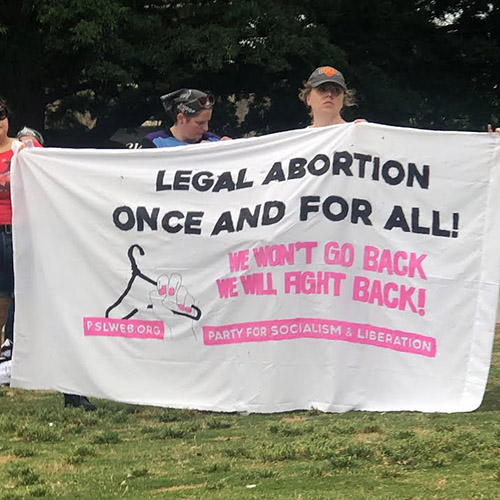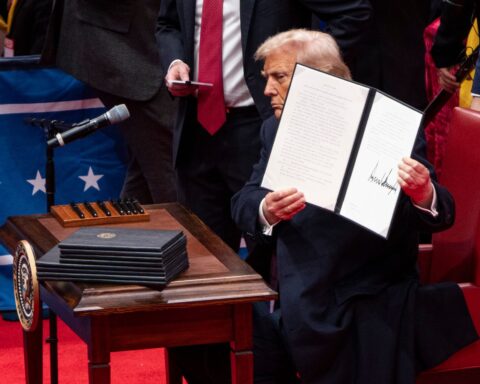Over 100 candidates are vying for seats in the N.C. House and Senate in the 2022 election. While 70 of them are fighting to lessen abortion restrictions or remove them altogether, none have any advanced plans to make abortion more affordable, low-cost, or free.
The struggle against abortion bans, it seems, often eclipses the question of affordability.
Research done by Ms Magazine shows that 71 percent of young women (18-29) voters in battleground states are motivated to vote to support efforts to make abortions more affordable.
“What’s really motivating me to vote is Roe v Wade being overturned,” said mass communication senior Kaia Bond. “As a woman, I do feel kind of affected by the change that could possibly come with not having the right to our bodies.”
However, reviews of over a hundred campaign websites and News & Observer questionaires show that no candidates present a platform that includes making abortion more affordable.
While some states like California are introducing plans to subsidize abortions even the North Carolina candidates who make claims that abortion is a healthcare issue have not proposed policies to incorporate abortion costs into private or public healthcare plans, to subsidize costs, or to fight to include abortions in Medicaid expansion efforts.
“Without affordability, you can’t have access,” said Kathy Spillar, executive editor of Ms Magazine. “The important thing is that we guarantee access, no matter what your income.”
An abortion in North Carolina can range from $350-$2100, excluding travel costs. Cost can vary on a number of factors, including the form of abortion, whether or not you select sedation, how far along you are in your pregnancy, and if pain medication is needed.
Several states have laws restricting public and private healthcare insurance from funding abortions, and North Carolina is no exception. The N.C. General Assembly has passed three laws removing abortion coverage from the state employee health plan (except in limited circumstances), prohibiting insurance offered on the Affordable Care Act marketplace from providing abortion coverage, and prohibiting local and county governments from offering abortion coverage to their employees.
“I think that so many people don’t realize that a random emergency, whether it be medical, or your car breaking down, like a random several hundred dollar emergency is life ruining for most people,” said Beans Fernandez, a student at CUNY and a former board member of Carolina Abortion Fund.
“So many people just can’t accommodate a random $600 procedure that won’t be covered at all by insurance and keeps getting more expensive the longer you wait.”
North Carolina has 100 counties, but there are only 14 abortion clinics that span 9 of these counties. For people who live outside those nine counties, getting an abortion often includes lengthy travel costs. These travel expenses can create severe financial strains for women living in a state where the minimum wage is just $7.25 and over 1.4 million people live in poverty.
“I think [the cost] is insane for people who honestly need to get the abortion for medical reasons,” said Bond. “They might not be able to get it.”
In North Carolina, abortions are banned after 20 weeks. Most politicians who are claiming to be pro-choice focus their abortion stances on fighting current or future restriction laws.
“If we look pre-Roe being overturned, the South and a lot of places around the US were already living effectively without the right to abortion. [People] can’t pay for it. They have to drive miles, hours sometimes, travel to different states to get it,” said Fernandez.
“There is no right to abortion if there’s no access. There has to be material access to abortion itself for it to be actually a choice and actually a right that people have.”
The fight to make abortions affordable in North Carolina would more than likely be a time consuming and lengthy process. First, politicians would need to fight to remove the Hyde amendment – a commitment Senate candidate Cheri Beasley has made – as well as all other North Carolina specific laws regarding abortion funding before they can even propose a plan to make abortions more affordable to those seeking abortions.
However, if politicians were able to successfully do that there are several options available for lowering abortion costs but one of the most popular is treating abortion like a healthcare issue and getting it covered through health insurance.
“’It’s very important that we work for laws and policies that cover abortion as part of health insurance programs, including Medicaid,” said Spillar. “We want to be sure that all the options available through the Affordable Care Act, also cover abortion services.”
While there may be no clear promises from political candidates to fight for affordability, abortion restriction remains a key issue in the 2022 election mobilizing many young voters.
“The biggest mistake would be to think that your vote doesn’t matter,” said Spillar. “Some of these elections are so close that it comes down to just a few 100 votes. And [NCCU] alone could deliver the margin of difference in a close election.
Early voting began on October 20 and ends on November 5. Students can vote at the Turner Law building.
Story by Nada Merghani.
Editor-in-chief of Campus Echo.


















